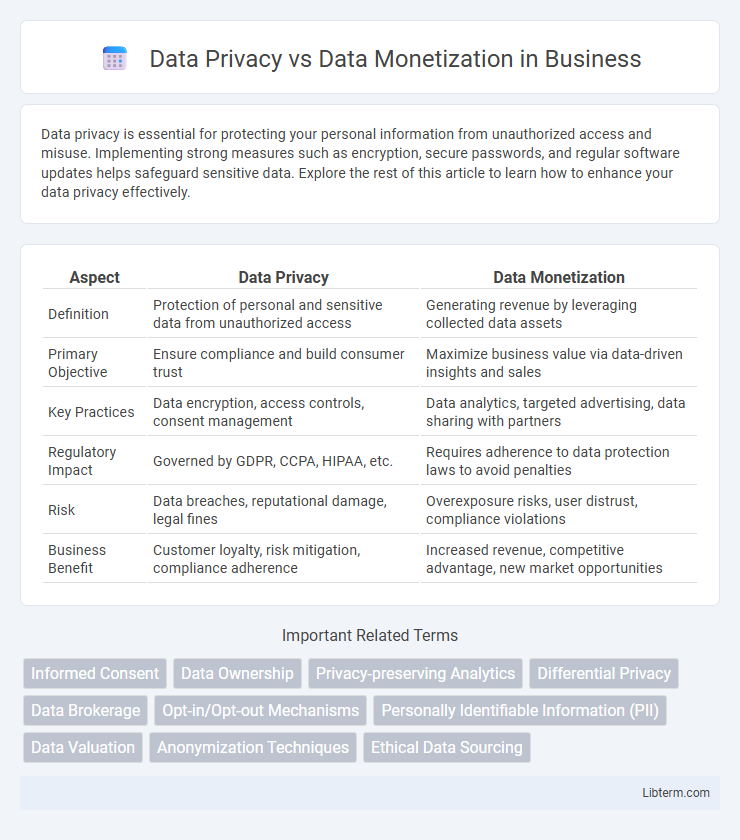Data privacy is essential for protecting your personal information from unauthorized access and misuse. Implementing strong measures such as encryption, secure passwords, and regular software updates helps safeguard sensitive data. Explore the rest of this article to learn how to enhance your data privacy effectively.
Table of Comparison
| Aspect | Data Privacy | Data Monetization |
|---|---|---|
| Definition | Protection of personal and sensitive data from unauthorized access | Generating revenue by leveraging collected data assets |
| Primary Objective | Ensure compliance and build consumer trust | Maximize business value via data-driven insights and sales |
| Key Practices | Data encryption, access controls, consent management | Data analytics, targeted advertising, data sharing with partners |
| Regulatory Impact | Governed by GDPR, CCPA, HIPAA, etc. | Requires adherence to data protection laws to avoid penalties |
| Risk | Data breaches, reputational damage, legal fines | Overexposure risks, user distrust, compliance violations |
| Business Benefit | Customer loyalty, risk mitigation, compliance adherence | Increased revenue, competitive advantage, new market opportunities |
Understanding Data Privacy: Definition and Importance
Data privacy refers to the protection of personal information from unauthorized access and misuse, ensuring individuals maintain control over their sensitive data. It is crucial in preventing identity theft, financial fraud, and safeguarding trust between consumers and organizations. Regulatory frameworks like GDPR and CCPA emphasize the importance of data privacy by enforcing strict compliance, highlighting its role in maintaining ethical data handling practices.
What is Data Monetization? Key Concepts
Data monetization refers to the process of generating economic value from available data assets by transforming raw data into actionable insights, products, or services. Key concepts include data licensing, where organizations sell access to datasets; data analytics, which drives predictive insights for strategic decisions; and data-driven marketing, leveraging consumer information to enhance targeting and personalization. Balancing data privacy regulations such as GDPR and CCPA is crucial to ensure compliant monetization strategies that protect user rights while maximizing revenue potential.
The Intersection of Data Privacy and Monetization
Data privacy and data monetization intersect at the critical balance between user consent and value extraction from personal information. Companies leveraging advanced encryption and anonymization techniques can monetize data while preserving individual privacy rights. Regulatory frameworks such as GDPR and CCPA enforce strict guidelines, pushing organizations to develop transparent data strategies that prioritize consumer trust alongside revenue generation.
Legal and Regulatory Frameworks Impacting Data Usage
Legal and regulatory frameworks such as GDPR in Europe and CCPA in California establish strict guidelines for data privacy, mandating transparency, user consent, and data protection measures that directly influence data monetization strategies. These regulations limit the scope of data collection and usage to prevent misuse, compelling companies to adopt privacy-centric business models while balancing revenue generation. Non-compliance risks include substantial fines and reputational damage, driving organizations to integrate robust compliance systems into their data monetization efforts.
Risks Associated with Data Monetization
Data monetization poses significant risks including unauthorized data sharing, breaches of consumer privacy, and potential non-compliance with regulations such as GDPR and CCPA. Exploiting personal data for profit can lead to reputational damage, legal penalties, and loss of customer trust. Organizations must implement robust data governance frameworks and transparent consent mechanisms to mitigate these risks effectively.
Strategies for Balancing Privacy with Profit
Effective strategies for balancing data privacy with monetization involve implementing privacy-by-design principles and adopting robust data governance frameworks to ensure compliance with regulations like GDPR and CCPA. Employing techniques such as data anonymization, differential privacy, and secure multi-party computation enables organizations to extract valuable insights without compromising individual privacy. Leveraging transparent user consent management platforms and establishing clear data usage policies foster trust, enhancing customer loyalty while driving revenue growth through ethical data monetization.
Consumer Trust: The Cornerstone of Data Practices
Consumer trust is the cornerstone of effective data privacy and monetization strategies, as transparent data practices build confidence and foster loyalty. Companies that prioritize robust data protection measures while clearly communicating monetization methods enhance user consent and engagement. Balancing privacy with data-driven revenue models ensures sustainable growth and mitigates regulatory risks.
Ethical Considerations in Leveraging User Data
Ethical considerations in leveraging user data revolve around ensuring transparency, obtaining informed consent, and respecting user autonomy while balancing data privacy with data monetization goals. Companies must implement robust data protection measures aligned with regulations such as GDPR and CCPA to prevent misuse and unauthorized access. Prioritizing ethical data practices fosters user trust, mitigates reputational risks, and supports sustainable monetization strategies.
Future Trends in Privacy and Monetization
Emerging technologies such as artificial intelligence and blockchain are reshaping data privacy frameworks while enabling innovative monetization models that prioritize user control and transparency. Regulatory landscapes like GDPR and CCPA are evolving to balance consumer protection with commercial interests, encouraging companies to adopt privacy-aware data strategies. The future of data monetization hinges on trusted data ecosystems where privacy-preserving techniques such as differential privacy and federated learning become standard practices.
Best Practices for Responsible Data Management
Effective data privacy and data monetization require implementing robust encryption methods and strict access controls to protect sensitive information while enabling ethical data use. Transparently communicating data usage policies and obtaining explicit user consent ensures compliance with regulations like GDPR and CCPA, fostering trust and accountability. Regular audits and data minimization techniques reduce risk exposure, balancing value extraction with privacy preservation in responsible data management.
Data Privacy Infographic

 libterm.com
libterm.com